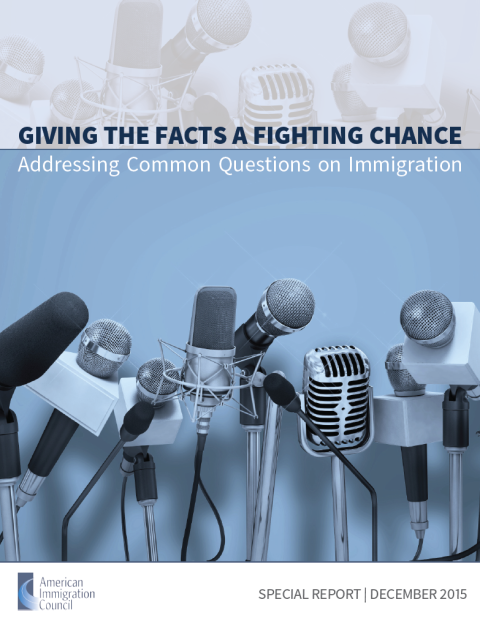Integration

Examining Gaps in Digital Inclusion as States Develop Their Digital Equity Plans
These fact sheets provide data to inform policymakers and advocates of the gaps in access to broadband internet among various covered individuals, with the goal to help identify remedies and build a more inclusive, equitable digital future. Read More

The Role of Contact and Values in Public Attitudes Toward Unauthorized Immigrants
This report uncovers the degree to which contact with immigrants and personal values are associated with views about unauthorized immigrants. Read More

The Immigrant Success Story
Some confusion exists regarding the economic aspects of family-based immigration. To help unpack those aspects, this report focuses on one of them—namely, the earnings of family-based immigrants. Read More

The Sins of the Fathers: The Children of Undocumented Immigrants Pay the Price
For the undocumented in America there is little doubt that the iniquities of the father are visited upon the child. On November 7th, for instance, an astounding 71 percent of voters in Arizona passed a referendum (Proposition 300) which states that only U.S. citizens and legal residents are eligible for in-state college tuition rates, tuition and fee waivers, and financial assistance. These are kids brought by their parents to this country as young children, in many instances infants in their mothers’ arms, and in every instance as children for whom the decision to come here was made without their participation. And yet, they shall pay the price, perhaps with their futures. The same referendum would deny childcare to the U.S.-citizen children of undocumented parents. Yes, the child is a citizen of the United States, but voters in Arizona have concluded that to provide the child with care is to reward the parents for the sin of seeking a better life in America. Read More

Entrepreneurship and Innovation in Welcoming Cities
Understanding what works, and sharing knowledge about effective initiatives to encourage entrepreneurship, will become increasingly important as immigrant entrepreneurs, business owners, and workers become more crucial to local economies across the United States. Read More

Giving the Facts a Fighting Chance: Addressing Common Questions on Immigration
Americans pride themselves on belonging to a nation of immigrants. In fact, many Americans celebrate not only the traditions of the United States, but the traditions of the countries from which their families came. Today, immigrants make enormous contributions to our economy and our communities—just as they always have. Yet… Read More

Gendered Paths to Legal Status: The Case of Latin American Immigrants in Phoenix, Arizona
This special report by Cecilia Menjívar and Olivia Salcido for the Immigration Policy Center looks at immigration law, which on its face appears gender neutral, but actually contains gender biases that create barriers for many women trying to gain legalization within the current immigration system. These inequalities appear across immigration law, and even as new laws are put into place, stereotypes and assumptions remain unchallenged. Ironically, even laws written specifically to protect women, such as the Violence Against Women Act (VAWA), continue to play out in practice along gender-biased lines. As immigration reform is being debated, our findings point to the need that any pathway to citizenship and integration be open, affordable, and accessible to all immigrant women, including those whose work is unpaid, and those employed in the informal economy. In order for this to occur, there should be more and stronger open channels for women to access the legalization process without having to rely on a principal visa holder to petition on their behalf. Listen to the teleconference. Read More

Citizenship Day 2012: Realizing the Potential of the Immigrant Vote
For many aspiring immigrants, achieving citizenship means full participation in civic life—and that means the right to vote. Every year, thousands of immigrants become naturalized U.S. citizens and exercise their new right. In the 2010 national elections, naturalized citizens comprised 6.4% of all voters. The voter registration rate among immigrants as a whole has risen since 2000. Just as importantly, a growing number of U.S.-born children of immigrants are now coming of age and becoming voters. However, the full potential of the immigrant vote has not been reached. There are more than eight million legal immigrants in the United States who are eligible to naturalize but have not yet done so. The latent electoral power of these voters-in-waiting is enormous. In many parts of the country their votes could potentially swing elections. As described in a series of Immigration Impact blog posts by Rob Paral, there are numerous counties across the country where the number of Legal Permanent Residents (LPRs) who have arrived since 1985 exceeds the margin of victory in the Obama-McCain election. Moreover, the voter rolls of many counties would grow dramatically if LPRs who are eligible to naturalize actually did so and registered to vote. Although this could not happen in time for the 2012 election cycle, it could make a difference in future elections. In many U.S. counties, the number of Legal Permanent Residents (LPRs) who have arrived since 1985 exceeds the Obama-McCain margin of victory. Read More

Public Education for Immigrant Students: Understanding Plyler v. Doe
This fact sheet provides an overview of the Supreme Court’s decision in Plyler v. Doe and subsequent efforts by states and localities to avoid compliance with the decision. Read More

Pew Analysis Highlights Immigrant Integration and Economic Contributions
Immigrants integrate into U.S. society over time and they contribute to the U.S. economy. These crucial yet often-overlooked facts are illustrated well by the Pew Hispanic Center’s latest statistical profile of the foreign-born population. According to Pew’s analysis of Census data, most immigrants have been here for more than a decade, and the longer they have been here, the more likely they are to have become homeowners and learned English. Moreover, growing numbers of immigrants are becoming U.S. citizens, which translates into growing political clout. The Pew data also show the degree to which immigrants fuel labor-force growth and fill valuable roles in the economy as workers in both high-skilled and less-skilled occupations. In short, immigrants are integral to the nation’s social and economic fabric. Read More
Make a contribution
Make a direct impact on the lives of immigrants.
